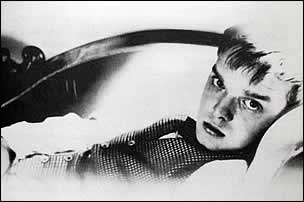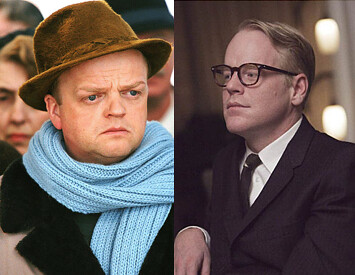I have been a big
Truman Capote fan for a while, actually ever since I read the classic
Breakfast at Tiffany’s about ten years ago. When I was a little girl I was simply in awe of
the beautiful Audrey Hepburn as the dazzling hooker heroine Holly Golightly (what’s in a name?) in the 1961 film adaptation. A true gem of style, sophistication and cynicism if there ever was one.
Capote is renowned for his tales involving love, loss and the upper class wrapped in a tight package of sympathy and a light-hearted bow to match. Needless to say, the perfect reading matter for a long hot summer.
 Capote himself was an exuberant society figure ( a real contemporary dandy) who started his career as a writer for various magazines (including the prestigious New Yorker) and became a full-fledged author when his first novel Other Voices, Other Rooms came out in 1948. His life and career were glitz and glamour all the way until he started writing the “non-fiction” novel In Cold Blood. From this point on his life and career were criticised even more than before. This important chapter in his life (which would eventually also lead to his downfall) became the subject matter of not one but two movies: Capote and Infamous.
Capote himself was an exuberant society figure ( a real contemporary dandy) who started his career as a writer for various magazines (including the prestigious New Yorker) and became a full-fledged author when his first novel Other Voices, Other Rooms came out in 1948. His life and career were glitz and glamour all the way until he started writing the “non-fiction” novel In Cold Blood. From this point on his life and career were criticised even more than before. This important chapter in his life (which would eventually also lead to his downfall) became the subject matter of not one but two movies: Capote and Infamous.
Intrigued by a newspaper article about a murder in a small town in Kansas, the legendary Truman Capote starts his own investigation while at the same time portraying the effect of the heinous crime on the community. He and his Pulitzer Prize-winning best friend Harper Lee (To Kill a Mockingbird) head of to Holcomb Kansas. Truman decides that there is so much more to the story and turns it into his next book, one that he wants to write with a little help from the convicted killers (hence the non-fiction part). The openly gay Capote eventually ends up falling for one of the men which adds an extra layer to the plot. This especially leads to personal turmoil seeing as he needs both men to die in order to have an ending to his magnum opus.
A year before Infamous (although recently released in Belgium, it dates back from 2006) the sensational Capote was released in which Philip Seymour Hoffman gives a sublime performance as the tragic Capote. The stories are exactly the same but stylistically both movies are worlds apart. Infamous is bold, bright and out there like Truman himself. The movies als o zooms in a bit more on the society aspect of Capote’s life whereas the in all other areas superior Capote turns the story into a more demure, emotional and factual account of the event. Capote’s relationship with inmate Perry Smith is portrayed with same delicacy and beauty as a Faberge egg in the lather while Infamous gets straight to the point resulting in some head on action between Toby Jones and Daniel (Bond) Craig. These conflicting approaches (the sedate vs the spectacular) are also immediately clear by simply looking at the movie posters.
o zooms in a bit more on the society aspect of Capote’s life whereas the in all other areas superior Capote turns the story into a more demure, emotional and factual account of the event. Capote’s relationship with inmate Perry Smith is portrayed with same delicacy and beauty as a Faberge egg in the lather while Infamous gets straight to the point resulting in some head on action between Toby Jones and Daniel (Bond) Craig. These conflicting approaches (the sedate vs the spectacular) are also immediately clear by simply looking at the movie posters.
Toby Jones was funny but lacked the emotional depth and the authenticity of the Academy Award-winning Hoffman. Maybe I am biased seeing as in my opinion Hoffman can do no wrong (ex. Happiness, Magnolia, State and Main, only to name a few) but Jones’ portrayal only enhanced the caricature that Capote became. Normally I am all for a little abundance but in this case it is hard to create an accurate depiction without ridicule seeing as Truman Capote was no ordinary fellow ( best known for his small stature, high pitched voice and offbeat clothing) and even without his brilliant books (especially the controversial In Cold Blood), he would have probably become as the title suggests infamous. This is also the reason why it is easy to get caught up in the persona for sheer entertainment value (hence also Infamous’ star studded cast) and lose sight of the man, the story and the impact they created.
 Capote himself was an exuberant society figure ( a real contemporary dandy)
Capote himself was an exuberant society figure ( a real contemporary dandy) o zooms in a bit more on the society aspect of Capote’s life whereas the in all other areas superior Capote turns the story into a more demure, emotional and factual account of the event. Capote’s relationship with inmate Perry Smith is portrayed with same delicacy and beauty as a Faberge egg in the lather while Infamous gets straight to the point resulting in some head on action between Toby Jones and Daniel (Bond) Craig. These conflicting approaches (the sedate vs the spectacular) are also immediately clear by simply looking at the movie posters.
o zooms in a bit more on the society aspect of Capote’s life whereas the in all other areas superior Capote turns the story into a more demure, emotional and factual account of the event. Capote’s relationship with inmate Perry Smith is portrayed with same delicacy and beauty as a Faberge egg in the lather while Infamous gets straight to the point resulting in some head on action between Toby Jones and Daniel (Bond) Craig. These conflicting approaches (the sedate vs the spectacular) are also immediately clear by simply looking at the movie posters.


No comments:
Post a Comment